Rangahau - Research
Our staff include leading researchers in issues pertaining to Māori and Pacific Development, indigenous studies and culture and language revitalisation. Through our research we provide national and international leadership in Māori, Pacific and indigenous issues and sustainable development.
Centre for Māori & Indigenous Research (CMIR)
The strategic goal of the Centre for Māori & Indigenous Research is to become a centre of research excellence capable of fostering and facilitating the self-determination, self-governance and development efforts of indigenous peoples in New Zealand, Australia, and Pacific rim countries generally.
Its research and development activities are supported through research scholarships and the provision of opportunities for emerging scholars to conduct doctoral and post-doctoral research. The Centre continues to form strategic alliances with relevant research institutions both here and overseas. It also provides an advisory service, and assists in the dissemination and publication of research and development findings. The Centre facilitates academic exchanges, conferences, hui, seminars and convocations.
Staff and students of the Faculty of Māori and Indigenous Studies engage in theoretical and applied research in the core disciplines and inter-disciplinary fields that constitute their primary academic focus. That research is aligned with the government's national goals and is designed to meet the needs and aspirations of those local, national and international communities with which the Faculty identifies in its mission, vision and strategic planning goals and with whose members it maintains an ongoing collaborative relationship. Our research and teaching are integrated and both are designed to contribute to theory, practice, and public policy in New Zealand and around the globe.
Ngā Kaupapa o Te Wā | Current Research Projects
Pacific Climate Change Mobility Research
The research seeks to understand the future scale, pattern and impact (social, cultural and economic) of climate change mobility in the Pacific region, including on Aotearoa New Zealand. Within this, the team will produce new insights on areas such as mobility decision-making, mobility and conflict, cultural, economic and social impacts of mobility, land context, risks and implications, climate adaptation challenges, the role of the church and the role/s of the international diaspora.
Led by Professor Sandy Morrison
Working to End Racial Oppression: WERO
WERO means to provoke, agitate and inspire. Our researchers actively take up the challenge of confronting institutional and interpersonal racism in Aotearoa.
Racism represents one of the most significant challenges facing Aotearoa. The effects of racism are extensive, manifesting in everyday forms of discrimination for Māori, Pacific peoples and minoritised ethnic communities. Entrenched in systems and structures that create disadvantage for minorities, and advantage for privileged ethnic majorities, racism is evident in inequitable outcomes across almost every indicator of wellbeing, including those within health, education, housing, employment and justice.
Science-Lead, Associate Professor Waikaremoana Waitoki
Funded through the Ministry of Business and Innovation Endevour Fund (MBIE)
Learn more about Our People at WERO
The Value of te reo Māori and tikanga Māori to the New Zealand economy
Researchers: Sandy Morrison, Te Kāhautu Maxwell
Project Summary:
Keywords: te reo Māori, tikanga
The Value of te reo Māori and tikanga Māori to the New Zealand economy
Researchers: Sandy Morrison, Te Kāhautu Maxwell
Project Summary: Overview: Since antiquity, people have always used the canvas of the night sky to embed historical, scientific and cultural knowledge. Early cultures orientated their beliefs, practices and understandings around the movement of the celestial bodies. Their detailed observations were interlaced with ecological and environmental information that was manifested and reaffirmed in ceremony and cultural practice. A new Marsden funded project, Te Mauria Whiritoi, will examine Māori beliefs, practices and observations in relation to astronomy, ecology and ritual. Using archaeoastronomy, cultural astronomy, oral history, semi-structured interviews, surveys, Wānanga and environmental observations, our research team, led by Dr Rangi Matamua (University of Waikato), with Dr Pauline Harris (Victoria University of Wellington), Dr Hēmi Whaanga (University of Waikato), Dr Ann Hardy (University of Waikato) and Dr Kaliko Baker (University of Hawai‘i at Manoa), will investigate how astronomy impacts upon ritual practice and is influenced by ecological and societal change. It will explore the interconnectedness between multiple disciplines from a traditional context, while also examining its contemporary application in our modern society through celebrations such as Matariki. This project will identify the sophisticated knowledge that is still encoded and integrated across many aspects of Māori life and is embedded within the Māori landscape. We will collect and preserve a significant body of indigenous astronomical knowledge that might otherwise be lost, benefiting cultural and linguistic sustainability and environmental practice in Aotearoa.
Keywords: Marsden, Whiritoi, astronomy, Matariki
Tarari! Tarara! Hakirara! Haka! Tikanga!
Researchers: Te Kāhautu Maxwell
Project Summary: Exploring the use of the word, analyse the metaphorical nuances and prophecies by the mid 19th century prophet Te Kooti. To unpack the stories told through his compositions and examine how these were interpreted by his followers who suffered due to the New Zealand land confiscation policies of the time and gave them hope and a will to endure. To collate the oral traditions that are held by high priests and how they interpret the philosophies and the Ringatū doctrine. From this research ascertain whether such discourse is relevant to the modern Māori and if so how does it influence the decision making processes of the Ringatū tribes. The objective is to normalize and integrate the use of the prophecies into the normal day to day spoken language of communication. Te Kooti was a prolific composer; the analysis of this formulaic discourse can be used as a framework to assist in the composition of contemporary poetry by established and emerging composers. This framework can be incorporated in the compilation of new oratory as practiced by the Māori.
Tangihanga Research Programme Team
Researchers: Prof. Ngahuia Te Awekotuku
Project Summary: Professor Ngahuia Te Awekotuku was a founding member of both the Centre for Maori Studies & Research (1974), and more recently the Maori & Psychology Research Unit. She is now the co-leader, with Associate Professor Linda Waimarie Nikora of Psychology, in the Tangi Research Programme. This research initiative offers an interdisciplinary focus for the study of dying, and the tikanga and reo of customary practice, grief, bereavement, healing, and end of life experience in the Maori world. It comprises a whānau of scholars, community practitioners, students, traditional ritualists and marae researchers. The image above records some of the project team at their immensely successful Inaugural Aotearoa Death Studies Symposium held in November 2010.
Keywords: Death, dying, tikanga and reo of customary practice, grief, bereavement, healing, end of life experience.
Applied Linguistics Projects
Researchers:
Project Summary: This group focuses on providing practical solutions to language-related problems. Areas in which they have a particular interest include: the teaching, learning and inter-generational transmission of languages (particularly indigenous languages); language policy and planning; contrastive rhetoric; critical discourse analysis; the theory and practice of translation; and bio-cultural conservation (including linguistic and ethical aspects of the classification of natural phenomena and the digitisation of indigenous knowledge). Since 2006, 11 researchers have completed PhDs in the context of this programme and a further 8 PhD projects are in progress. Members of the group have attracted externally-funded research contracts and a many fellowships, scholarships and research and travel awards, including doctoral scholarships awarded by the Tertiary Education Commission, overseas Ministries of Education and the Mellon-Hawaii Native Hawai’i Scholarship Programme, and post-doctoral fellowships awarded by the Tertiary Education Commission and the Foundation for Research, Science and Technology. Members of the group have produced a large number of books, book chapters and peer-reviewed academic articles and given many conference presentations in New Zealand and overseas.
Keywords: Indigenous langauges, language transmission, policy, contrastive rhetoric, critical discourse analysis, translation, ethics, digitisation.
The Māori Naming Project | Tapa Tapa Tū, Whakaea Kau Ana
Researchers: Dr Hēmi Whaanga, Tom Roa
Project Summary: For many years, the knowledge of indigenous peoples has been the preserve of western anthropologists and ethnographers. Like other indigenous peoples, Māori are concerned with the ongoing neglect, misuse and erosion of Traditional Ecological Knowledge (TEK). The aim of this research is to explore and record traditional classification systems of naming flora and fauna within Tainui-waka. The research also aims to investigate the relationship between indigenous taxonomy systems of Tainui-waka and the current Linnaean classification system in the appropriate naming of flora and fauna.
Keywords: Traditional Ecological Knowledge, taxonomy.
A window via the past for the future: the Pei Te Hurinui Jones Project | He matapihi mā mua, mō muri
Researchers: Dr Hēmi Whaanga, Tom Roa, Rangiiria Hedley, Dr Te Taka Keegan
Project Summary: The many works of esteemed Māori scholar, the late Dr. Pei te Hurinui Jones, have provided the catalyst for this research into the management, conservation, care and display of Māori information in a digital context.
This team of researchers, led by Dr Hēmi Whaanga and Senior Lecturer Tom Roa, have tackled the complex issues related to the digitisation of indigenous material and mātauranga Māori in a project to produce an accessible digital library in a form that is both practical and searchable by the general public.
In 2004, the University of Waikato Library unveiled Mahi Māreikura, a room dedicated to the display and conservation of the collected taonga and works of the late Pei te Hurinui Jones and a collection of the work of his colleague and close relative, Professor Bruce Biggs.
Keywords: Dr. Pei te Hurunui Jones, digitisation of indigenous knowledge, mātauranga Māori, conservation, digital library.
Whakataukī and conservation of biodiversity in Aotearoa | He rongo i te reo rauriki, i te reo reiuru
Researchers: Dr Hēmi Whaanga, Tom Roa, Dr Priscilla Wehi, Associate Professor Murray Cox
Project Summary: This Marsden funded project aims to uncover the past relationships that Māori have with the environment through an interdisciplinary study of traditional Māori ecological knowledge as expressed through whakataukī (Māori ancestral sayings). The ‘wisdom of the elders’ about how best to manage the environment is rapidly being lost, as is Aotearoa’s biological and cultural diversity. This interdisciplinary research project draws from linguistics, sociology, history and evolutionary theory to explore the knowledge and understanding of conservation and biodiversity embedded in whakataukī. We combine rigorous and innovative methodologies associated largely with the Western tradition of scholarship with equally rigorous and innovative methodologies associated largely with indigenous approaches. Using both qualitative and quantitative techniques, we will investigate the contribution that whakataukī can make to contemporary issues associated with language and cultural sustainability, biodiversity and conservation. This project breaks new ground with an approach to modelling that sits at the interface between indigenous and mainstream understanding. We will collect and preserve a significant body of cultural and biological knowledge that might otherwise be lost, benefiting Māori language and culture, linguistics and conservation in Aotearoa.
Keywords: Traditional Ecological Knowledge, whakataukī, conservation, biodiversity, sustainability, indigenous knowledge.
Rangahau me ngā Whakatinanatanga – University of Waikato
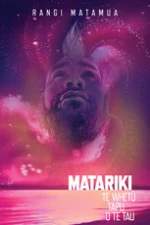 Researchers: Rangi Matamua
Researchers: Rangi Matamua
ISBN: 9781775503262
Keywords: Matariki, Māori, Astronomy
Output Summary
In mid-winter, Matariki rises in the pre-dawn sky, and its observation is celebrated with incantations on hilltops at dawn, balls, exhibitions, dinners and a vast number of events. The Matariki tradition has been re-established, and its regeneration coincides with a growing interest in Māori astronomy. Still, there remain some unanswered questions about how Matariki was traditionally observed. These include:
- What is Matariki?
- Why did Māori observe Matariki?
- How did Māori traditionally celebrate Matariki?
- When and how should Matariki be celebrated?
Based on research and interviews with Māori experts, this book seeks answers to these questions and explores what Matariki was in a traditional sense so it can be understood and celebrated in our modern society.
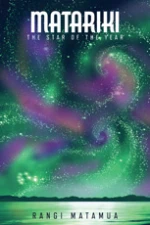 Researchers: Rangi Matamua
Researchers: Rangi Matamua
ISBN: 9781775503255
Keywords: Matariki, Māori, Astronomy
Output summary
In mid-winter, Matariki rises in the pre-dawn sky, and its observation is celebrated with incantations on hilltops at dawn, balls, exhibitions, dinners and a vast number of events. The Matariki tradition has been re-established, and its regeneration coincides with a growing interest in Māori astronomy. Still, there remain some unanswered questions about how Matariki was traditionally observed. These include:
- What is Matariki?
- Why did Māori observe Matariki?
- How did Māori traditionally celebrate Matariki?
- When and how should Matariki be celebrated?
Based on research and interviews with Māori experts, this book seeks answers to these questions and explores what Matariki was in a traditional sense so it can be understood and celebrated in our modern society.
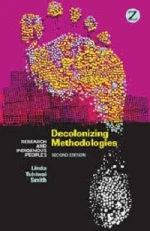 Researchers: Professor Linda Smith
Researchers: Professor Linda Smith
Publisher: Zed Books (2012)
ISBN: 1848139500
Keywords: Imperialism, Colonialism, Hegemony, Indigenous Peoples, Resistance, Emancipation, Research, Methodology, Epistemology, Decolonization, Critical Theory, Postcolonialism, Regimes of Truth.
Output Summary
From the vantage point of the colonized, the term 'research' is inextricably linked with European colonialism; the ways in which scientific research has been implicated in the worst excesses of imperialism remains a powerful remembered history for many of the world's colonized peoples. Here, an indigenous researcher issues a clarion call for the decolonization of research methods.
The book is divided into two parts. In the first, the author critically examines the historical and philosophical base of Western research. Extending the work of Foucault, she explores the intersections of imperialism, knowledge and research, and the different ways in which imperialism is embedded in disciplines of knowledge and methodologies as 'regimes of truth'. Providing a history of knowledge from the Enlightenment to Postcoloniality, she also discusses the fate of concepts such as 'discovery, 'claiming' and 'naming' through which the west has incorporated and continues to incorporate the indigenous world within its own web.
The second part of the book meets the urgent need for people who are carrying out their own research projects, for literature which validates their frustrations in dealing with various western paradigms, academic traditions and methodologies, which continue to position the indigenous as 'Other'. In setting an agenda for planning and implementing indigenous research, the author shows how such programmes are part of the wider project of reclaiming control over indigenous ways of knowing and being.
Exploring the broad range of issues which have confronted, and continue to confront, indigenous peoples, in their encounters with western knowledge, this book also sets a standard for truly emancipatory research. It brilliantly demonstrates that 'when indigenous peoples become the researchers and not merely the researched, the activity of research is transformed.'
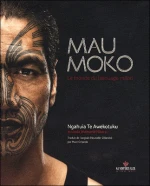 Researchers: Ngāhuia Te Awekotuku
Researchers: Ngāhuia Te Awekotuku
Publisher: Penguin (2011)
ISBN: 9780143566854
Keywords: Moko, tattoo, body art, spirituality, tradition, tikanga, identity, cultural revival
Output Summary
Taia o moko, hei hoa matenga mou . . .
Take your moko, as a friend forever . . .
In the traditional Maori world the moko, or facial or body tattoo, was part of everyday life; everyone had some patterning on their skin. Men wore elaborate designs on their faces; women's were usually less complex but elegant, and both sexes had extensive body work.
After almost dying out in the twentieth century, Maori skin art is now experiencing a powerful revival, with many young urban Maori displaying the moko as a spectacular gesture of ethnic pride and identity.
This hugely popular and magnificently illustrated book, compiled by a group of Maori scholars from the University of Waikato, is the closest there has ever been to a 'complete' book on moko. Mau Moko examines the use of moko by traditional Maori, notes historical material including manuscripts and unpublished, aural sources, and links the art to the present day. It explores the cultural and spiritual issues surrounding moko and relates dozens of stories, many of them powerful and heart-warming, from wearers and artists.
Mau Moko is superbly enhanced by images from early European encounters, traditional Maori representations, and new colour photography commissioned for the book by Becky Nunes.
Tirohia, he moko!
Look, and wonder, at the beauty of this art form . . .
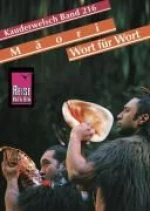 Researchers:
Researchers:
Publisher: Reise (2008)
ISBN: 9783894163259
Keywords: Dictionary, Māori, German, Idiom, Phrases, Translation.